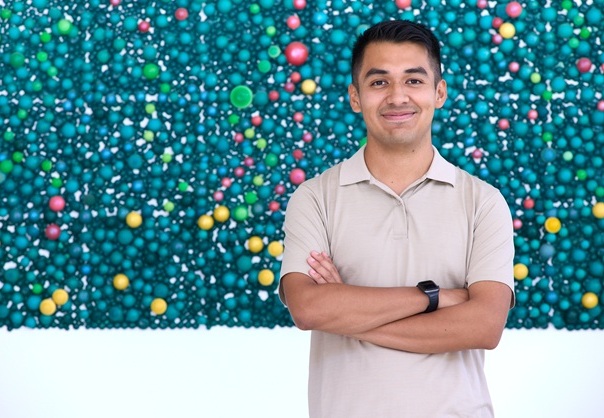
The Journey of Richard Coca
Richard Coca’s journey from a high school student in Los Angeles to neuroscience PhD candidate at Boston University shows the profound impact of early exposure to hands-on science education.
Discovering possibilities with Amgen Biotech Experience (ABE)
Growing up in South California, Richard’s interest in biology was sparked by the Amgen Biotech Experience (ABE) program during his freshman and sophomore years. ABE filled him with curiosity about the field while helping him develop practical lab skills that set the stage for his subsequent academic and research career.
The “game-changer”
Reflecting on his time in high school, Richard knew early on that he wanted to do something science-related but credits his biology teacher, Wendy Wooten, and the ABE program for providing direction and a significant edge. “The ABE program was a game-changer for me and influenced my decision to do a STEM degree,” Richard recalled. “Before that, the only lab experience I had was the typical frog dissection, which didn’t feel very impactful.”
Hands-on lab work
“ABE introduced me to hands-on lab work and experiments, and I looked forward to every session,” said Richard. He considered himself “lucky” to be exposed to ABE again as a sophomore in AP biology. “Wendy was my ABE teacher both times and was so inspirational, I still call her my superhero,” exclaimed Richard. “At that stage, I was familiar with ABE and would help show other students how to do certain experiments and troubleshoot any issues. I also volunteered to help at the teacher training workshops at a local community college.”
ABE helped make me ‘college ready’
By the time Richard applied to Stanford, the proficiency he gained in molecular biology through ABE helped his profile stand out. “Having ABE on my resume really set me apart in terms of college readiness,” said Richard.“It showed that I had hands-on experience with lab techniques that many of my peers didn’t have until much later.”
ABE techniques directly applicable to my work at Stanford
At Stanford, Richard continued to leverage his ABE experience. The skills he acquired allowed him to transition smoothly into bioinformatics and later back into wet lab research, even during the pandemic. Working with Dr. Wheeler at the Undiagnosed Disease Network, Richard applied his molecular biology skills to investigate genetic factors in rare diseases. “The techniques I learned in ABE were directly applicable to my work at Stanford,” added Richard. “It gave me the confidence to take on complex experiments and mentor my peers.”
Graduate Program in Neuroscience
Now at Boston University, Richard is delving into synaptic regulation and neurodevelopment as part of the Graduate Program in Neuroscience. His projects include molecular cloning to investigate genetic factors in neurodevelopment, using techniques similar to those he used in the ABE program during his high school years. Despite the demands of academia, Richard finds balance through his love for music and exploring the vibrant scientific community in Cambridge.
A family affair
While Richard is the first in his family to attend university, his siblings have closely followed in his footsteps — both participating in ABE and now pursuing biology careers. “My sister is studying marine biology at Cal State Northridge, while my brother is a student of molecular and cell biology at the University of California, San Diego,” explained Richard.
Early opportunities shape future scientists
Richard’s story is a powerful reminder of how access to early educational opportunities can shape future scientists. His advice to current ABE students is to embrace the learning process and not to be discouraged by failures. “Science is full of trial and error,” said Richard. “The setbacks are just as important as the successes. It’s how you learn.”
Richard emphasizes the importance of programs like the Amgen Biotech Experience and dedicated teachers like Wendy. “I didn't just learn about science – ABE showed me what I was capable of achieving,” said Richard. “It [ABE] is a big reason why I’m here today.”
About the Amgen Biotech Experience
Established in 1990, the Amgen Biotech Experience (ABE) provides professional development and curriculum, materials as well as loaned research-grade equipment and reagents at no cost to participating schools in 16 countries across the world. Last year, ABE reached over one million students worldwide, celebrating a movement towards hands-on science education.